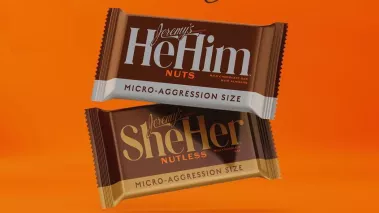Table of Contents
Madera Community College goes nuts, suspends professor over candy bars

@JeremyDBoreing / Twitter.com
Packages of Jeremy's Chocolate Micro-Aggression Size candy bars. (@JeremyDBoreing / Twitter.com)
Madera Community College has suspended a tenured history professor for passing out allegedly offensive candy bars at a campus event. FIRE wrote Madera, urging it to reverse course and respect faculty expressive rights.
According to news reports, professor David Richardson brought the unique chocolate bars to an April 29 open house on the central California campus and distributed them to visitors at his table. The chocolate bars come in two varieties: with nuts, labeled “HeHim,” and without, labeled “SheHer.”
“Some chocolate companies don't even know what a woman is. But we do,” reads the product description. “Indulge in the chocolate binary. One with nuts, one without. You know which is which.”
The candy is made by Jeremy’s Razors, a company founded by Daily Wire co-CEO Jeremy Boreing, and is intended to mock The Hershey Company’s decision to feature a trans woman on their limited-edition “HER for SHE” chocolate bars.
The Supreme Court has repeatedly, consistently, and clearly held government actors may not restrict expression on the basis that others find it offensive or hateful.
At the Madera College event, another professor, offended by the Jeremy chocolate bars’ packaging, confronted Richardson. Not wanting to make a scene, Richardson declined to engage and believed the situation had been resolved.
Until, that is, the police arrived at his door.
Having heard nothing about the incident from his employer, Richardson was “gobsmacked” to be handed a letter of suspension by a uniformed school police officer. He has since been locked out of his school email account and banned from campus, pending the results of an investigation for “creating a hostile work environment based on gender.”
Yesterday, FIRE wrote Madera, urging it to comply with its legal obligations by ending its investigation and rescinding its suspension of Richardson. As we wrote, the law is clear:
It is apparent that Richardson distributed the parody candy bars to express his views about the gender, pronoun, and diversity issues he perceived on campus. Doing so falls squarely under the First Amendment’s protections for expressive activity. The Supreme Court has repeatedly, consistently, and clearly held government actors may not restrict expression on the basis that others find it offensive or hateful. The freedom of expression enshrined in the First Amendment “does not end at the spoken or written word.” To the contrary, any conduct “intend[ed] to convey a particularized message” that is likely to “be understood by those who viewed it” is expressive conduct within the meaning of the First Amendment.
Here, Richardson wanted to express his views on a hot-button social issue and he used parodic candy bars to do so; his distribution of them is protected by the First Amendment and cannot be grounds for punishment.
While Madera evidently thinks this whole “free speech” thing is a tough nut to crack, it’s really pretty simple — the First Amendment prohibits public institutions from retaliating against students and professors based on their viewpoint. And yes, that applies to views expressed on chocolate bars as well.
FIRE defends the rights of students and faculty members — no matter their views — at public and private universities and colleges in the United States. If you are a student or a faculty member facing investigation or punishment for your speech, submit your case to FIRE today. If you’re a faculty member at a public college or university, call the Faculty Legal Defense Fund 24-hour hotline at 254-500-FLDF (3533). If you’re a college journalist facing censorship or a media law question, call the Student Press Freedom Initiative 24-hour hotline at 717-734-SPFI (7734).
Recent Articles
Get the latest free speech news and analysis from FIRE.

FIRE's 2025 impact in court, on campus, and in our culture

The trouble with banning Fizz

VICTORY: Court vindicates professor investigated for parodying university’s ‘land acknowledgment’ on syllabus


